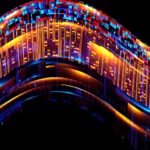Juan Ignacio Cirac: "Banks will be safer thanks to quantum physics"
Respected Spanish scientist Juan Ignacio Cirac believes that quantum computing could be a reality in 10 year's time. A super machine capable of performing calculations at breakneck speeds that will open uncharted territories in matters such as encryption.

In 1994, employees of the U.S. National Security Agency started attending scientific congresses. But not just any congresses: only those in which quantum physics-related matters were discussed. They were eager to know when the first viable quantum computer would be built. What were they so concerned about?
Juan Ignacio Cirac is one of the world’s most authoritative voices in quantum physics. This Catalonian, who moved to Germany 15 years ago - Príncipe de Asturias Laureate in Scientific and Technical Research (2006), and BBVA Foundation Frontiers of Knowledge Award in the Basic Sciences category 2008- visited BBVA's Innovation Center in Madrid to take part in an event organized by Cátedra I4S-URJC to talk about the history of quantum physics and the long-awaited arrival of the quantum computer.
Both during his keynote presentation and in an interview with BBVA, Cirac made it clear that quantum computers do not exist and will not be here tomorrow, but could be ready in the next decade. And it will change the world.
The explanation of why quantum computing is drawing such level of attention from U.S. intelligence services lies in the essence of quantum physics. In Cirac’s own words, “quantum physics explain what happens in the microscopic world, in the world of the things that our eyes cannot perceive.”
What makes it so special? Why can quantum physics change the world? One of the properties that quantum physics explain is that microscopic particles can do something extraordinary: be in two places at once, what is known as quantum superpositions.
“Atoms,” as Cirac explained, “don’t come out of a hole up or down up, but down and up at the same time, they are in both states at the same time. And this happens not just to atoms. Everything that is in the microscopic world has this extraordinary property.”
The possibilities of the quantum computer
Logically, if it can be in two places at the same time, it will allow to, at the same time, solve problems that couldn’t be solved before. Capabilities become infinite. And this is where the quantum computer, about which the NSA is so concerned, comes into play.
What’s the main advantage of a quantum computer vs. a classic computer? For Cirac, a quantum computer “can solve, very quickly, problems that are impossible to solve for classic computers.” And he added: “a quantum computer is formed with quantum bits and thanks to the superpositions it is capable of performing many calculations at the same time, and that gives them an extraordinary power.”
But apart from that, these computers will also be capable of cracking encrypted messages at uncanny speeds – Shor's Algorithm-. With quantum computers, it would take us just as long to multiply as to factor, while factoring in classic computers is a very slow process. The fact that factoring is more difficult than multiplying is what makes encryption methods trustable and secure.
Why? Because what our computers do is multiply to encrypt messages, and, to decrypt them, the receiving computer also multiplies. If somebody wants to read the transmission to reveal the content of the message, that person needs to factor the message, something that’s much harder and time consuming than multiplying. Quantum computers, instead, can decrypt messages very quickly.
This is something about which national security services are extremely concerned. Standard encryption methods will be rendered useless by quantum computers. What a classic computer would take 2000 years to decrypt, a quantum would take five hours.

Despite that, every now and then seem to hint at the imminent advent of quantum computer, the Spanish scientist emphasized that they do not exist yet.
Google, Intel, IBM and many countries are working hard on these systems, but the task is not easy. Why? Because our world destroys the superpositions. In other words: if the microscopic and the macroscopic world interact the extraordinary property of superpositions disappears.
As Cirac emphasized: “To have a quantum computer we need to isolate quantum bits completely from the outside world. The problem is that to factor an interesting number, we would need to isolate about 4,000 bits, something that’s extremely complicated because quantum bits cannot interact with anything.”
For the expert, in two or three years, this problem will be solved and a quantum computer will be built capable to tackle tasks that are impossible for today’s computers. But it will be an absurd task and we will have to wait from 10 to 20 years to see quantum computers performing relevant factoring calculations.
And if the quantum computer is finally built, it will be possible to develop quantum encryption, which will be impossible to break. Quantum encryption will allow to send messages in superpositions. If someone tries to hack it they would be destroyed and the receiver would know that someone has read the information. Quantum physics also facilitates teleportation: a process by which the information appears in one place without travelling through a medium, making it impossible to hack.
And what does quantum physics bring to the world of banking? Cirac highlighted that it will have a tremendous impact on security, “in communication, in the exchange of extremely safe data thanks to quantum encryption,” he specified.
Looking forward, he added, we will have quantum credit cards and money. “We will have credit cards that no one will be able to copy, formed on the inside by quantum bits in superpositions that would be destroyed if anyone were to read them. It is a technique that still in its nascent stage, because it needs for quantum bits to last for, at least, a year, and today, their average life span is of, approximately, a couple of days,” he explained.
The sector that is going to benefit the most from the appearance of the quantum computer is, according to Cirac, “that of material and chemical engineers. Those who, today, use supercomputers to design materials and chemical compounds.”
Cirac thinks we will see the first quantum computer in 10 years. In ten years, he expects Artificial Intelligence and automation will help us all, not just a few, enjoy higher living standards and live longer. Time will say if this will be possible and if the quantum computer will be, at last, real.